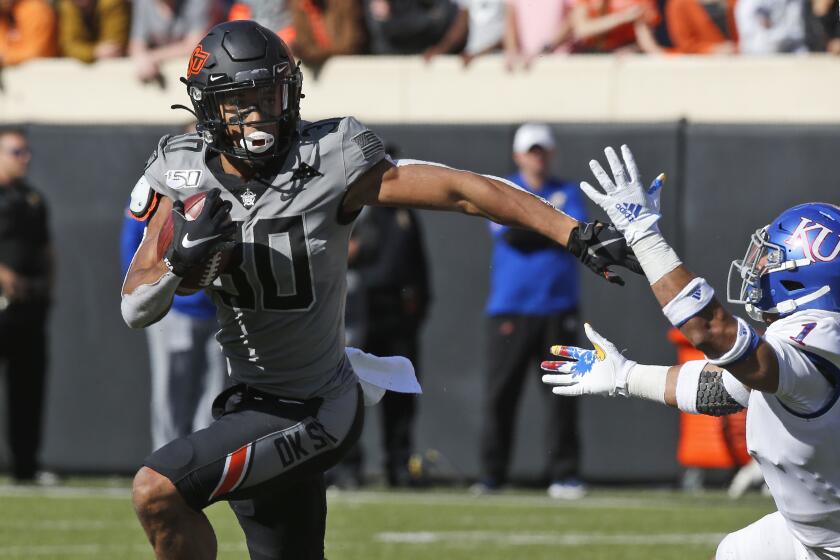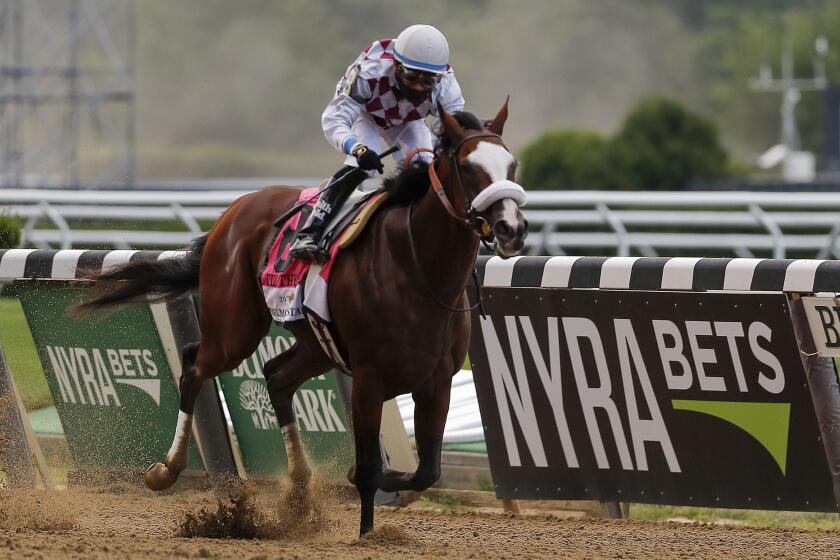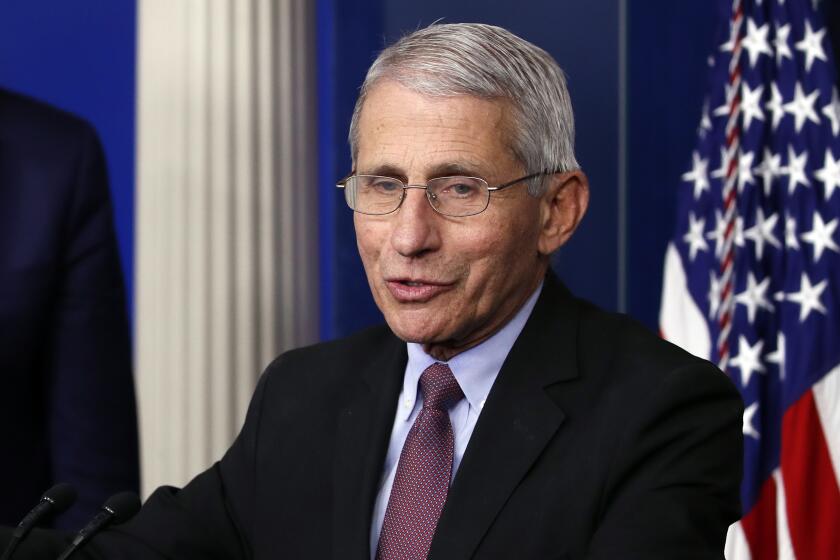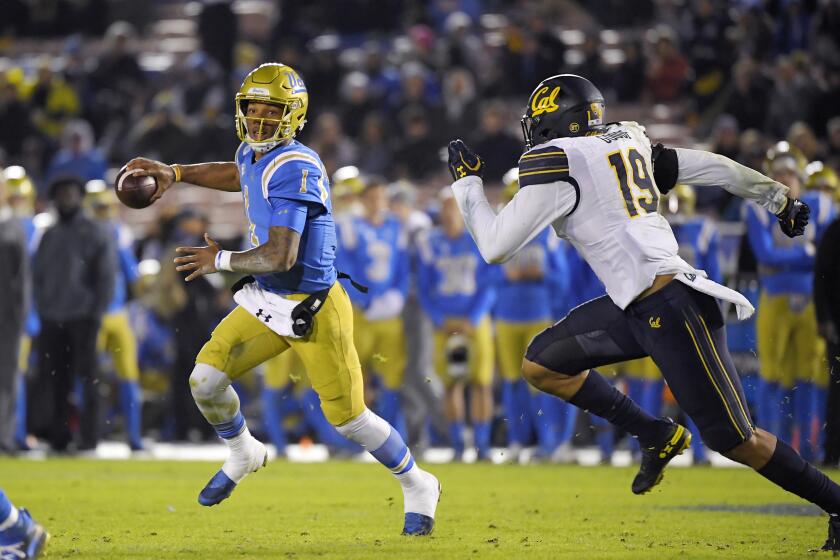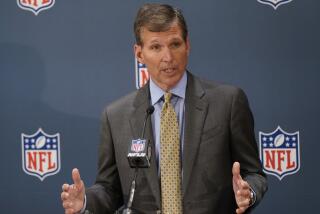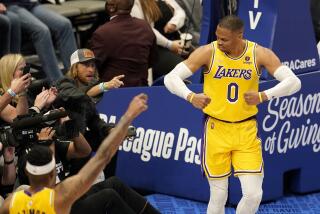Column: Sports leagues playing the most dangerous of games during pandemic
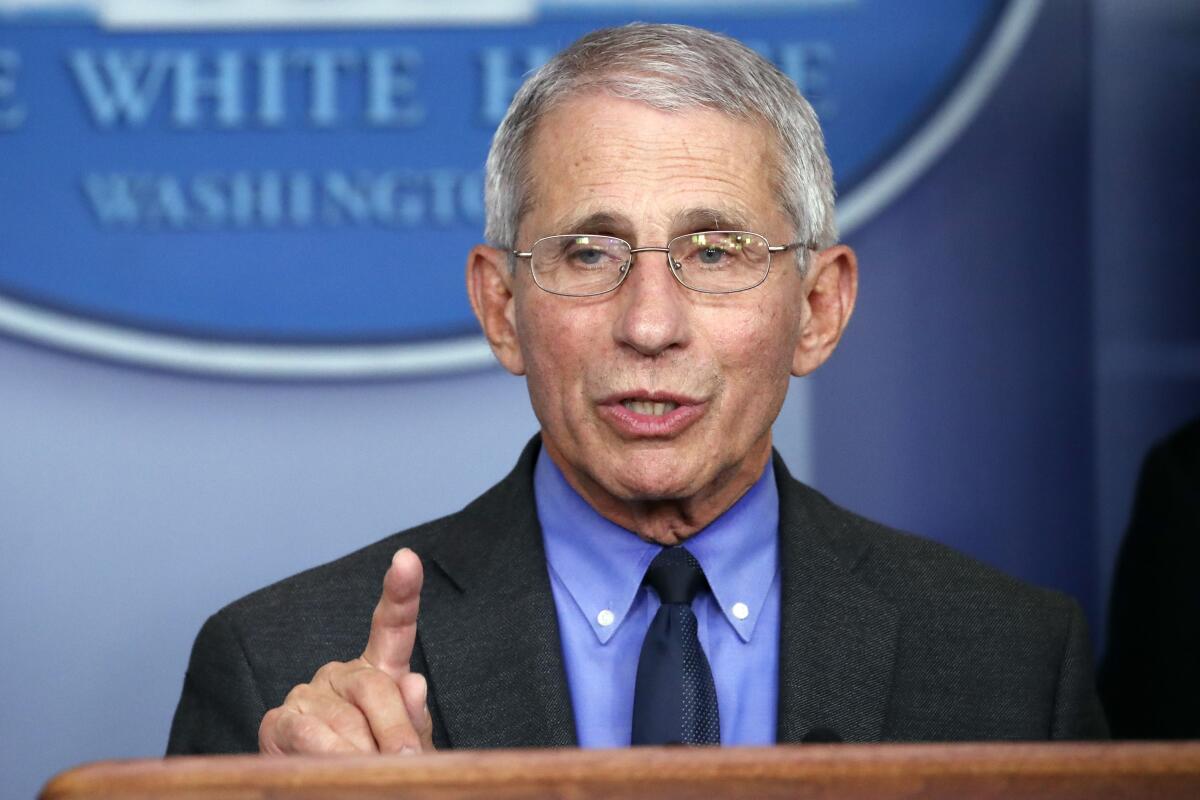
- Share via
They’re not going to stop until somebody dies.
That seems to be the only certainty in the American sports leagues’ frighteningly headstrong attempt to restart their billion-dollar machines in the middle of a COVID-19 pandemic.
A dizzying spike in cases won’t halt them. Safety pleas from teenage athletes don’t slow them. Warnings from the leading infectious disease specialists aren’t bothering them.
At the end of a week when the surging virus resulted in new single-day infection records in nine states with increases in 20 states, the sports world held its hallowed ground.
America’s cultural reckoning means college athletes and recruits can make demands and ask big programs a big question: What will you stand for?
Even as positive test rates grew, every sport remains positive it is going to play. There’s too much money at stake. There are too many television and sponsor commitments to keep. It’s too late to back out now. The sheltered owners are insistent on fighting a fight they may not win, leaving the vulnerable athletes with the most to lose.
The NBA is dribbling ahead even though its bubble has already burst. The NFL is driving downfield while experts are trying to tackle it. College football is preparing for fans while engulfed in sick kids. The NHL is picking playoff sites even as positive tests shut down Tampa Bay’s practice facility. Baseball is too worried about money to even focus on health.
One infectious disease expert interviewed Saturday applauds the restart efforts, but urged officials to have the good sense to know when to pivot.
“It’s easy for me as a physician and not at an athlete at that level to say, ‘Oh, let’s be careful and not do anything, let’s call a mulligan on this season and pick it up again in April of 2021,’ ” said Dr. Shmuel Shoham, associate professor of medicine at Johns Hopkins University School of Medicine. “That is the safest choice, but is it too restrictive? I commend people trying to figure out creative ways to make something happen.”
However, Shoham said, the leagues need to understand when enough is enough.
“Now, there also has to be honesty, in that you do it and you see it just doesn’t work, then you have to be honest, and [say], ‘OK, we gave it a try and we’re going to pull back’ as opposed to saying, ‘OK, we’re trying and going full blast and damn the torpedoes,’ ” he said.
Tiz The Law wins by 3¾ lengths in the Belmont Stakes, which this year is the first leg of the Triple Crown.
By the recent looks of things, those torpedoes are pretty darn close to being damned.
The NBA is planning to begin games late next month in Florida even though its Disney World bubble is in the middle of a virtual petri dish. The surrounding Orange County has been setting daily records for positive coronavirus cases while its positive test rate has increased 650% in the last two weeks. Considering Disney employees will be allowed to move in and out of the bubble without adhering to the same quarantine measures as players, it might not be exactly the happiest place on earth.
The NFL, meanwhile, is gearing up for training camps even as the esteemed Dr. Anthony Fauci was saying the league probably couldn’t safely play without achieving the impossible task of keeping every team in that NBA-style bubble.
“Unless players are essentially in a bubble — insulated from the community and they are tested nearly every day — it would be very hard to see how football is able to be played this fall,” said Fauci, the director of the National Institute of Allergy and Infectious Diseases, in an interview with CNN.
He added, “If there is a second wave, which is certainly a possibility and which would be complicated by the predictable flu season, football may not happen this year.”
Dr. Anthony Fauci believes MLB would be wise to end a potential 2020 season in September before the coronavirus risk rises with the cold in October.
The NFL responded with a promise of increased safety protocols, which even their coaches have greeted with disbelief.
“I’ve seen all the memos on that, and to be quite honest with you, it’s impossible what they’re asking us to do ... humanly impossible,” Baltimore Ravens coach John Harbaugh told 105.7 The Fan. “It’s a communication sport … we have to be able to communicate with each other in person. We have to practice.”
Then there is college football, which is remaining rah-rah for September even though summer workouts have been an infection revelation. Positive tests have been recorded for 23 Clemson players, 13 Texas players, at least eight Alabama players, and enough athletes that Kansas State and Houston suspended workouts entirely.
Although positive tests have been reported among several other programs, those numbers are likely to be much higher, as most schools are not publicly revealing their numbers. The landscape is scary enough that this week 30 UCLA players issued a document begging the school for third-party oversight of coronavirus protocols.
UCLA unveiled its plan for the voluntary return of student-athletes to campus. Officials said they expect some positive test results for the coronavirus.
While the coronavirus mortality rate is minuscule, the demographic that included college athletes, the coaches and support personnel are often older. And, at any age, an athlete spending eight hours a day with others in locker rooms and dugouts and on benches and courts before coming home to more susceptible family members is a highly questionable scenario.
“The athletes … become infected in a way that doesn’t hurt them all that much … but then they can potentially bring that home to their family who have people who would be at high risk for a bad outcome,” Shoham said.
Finally, there is baseball, which is still trying to broker a season even as league officials shut down all training facilities in Florida and Arizona on Friday amid reports of numerous positive tests that include five stricken Philadelphia Phillies and two members of the Angels organization.
The ongoing labor dispute has nothing to do with safety protocols, even though coronavirus cases are on the rise in nine of 10 states that are home to teams in the proposed West region. It’s one thing to agree to play ball. It’s another thing to figure out where and how, but few are talking about that.
“The truth is, here we are, it’s middle of June, 2020, and none of us know what the best decision is, we’re all learning on the fly … none of us have been through a pandemic like this before,” Shoham said. “We don’t know what the right decision is, but we have a sense as to what the wrong decision is.”
The leagues have made their decision, so staunchly and stubbornly that we’re not going to know if it’s the wrong one until it’s too late. It’s the most optimistic of ventures. It’s the most dangerous of games.
More to Read
Go beyond the scoreboard
Get the latest on L.A.'s teams in the daily Sports Report newsletter.
You may occasionally receive promotional content from the Los Angeles Times.

